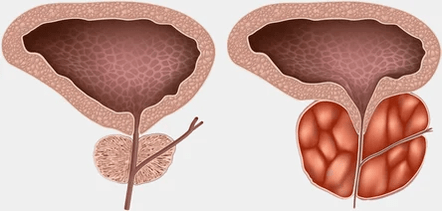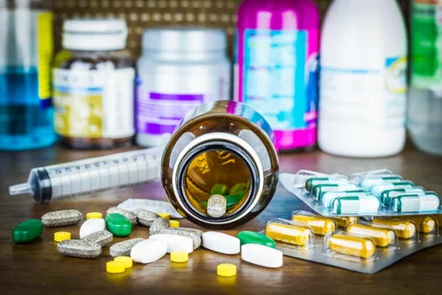
Prescribed medicines are most commonly prescribed when treating prostatitis.During the process of passing, patients must take various categories of medication.Some are designed to eliminate symptoms that cause discomfort, while others are intentionally directly affecting the affected glands, thus eliminating the most important causes.Meanwhile, drugs differ in terms of exposure, as some aim to eliminate acute, while others oppose chronic.Let's take a look at the most popular medicines used to treat prostatitis.
Types of drugs for prostatitis
All drugs specified by the subject physician can be divided into several categories through the use method:
- Tablets and capsules- They are accepted orally, moderately absorbed by the body, and in the case of capsules, the absorption is faster because after a short time after dissolving the gelatin film, all the ingredients fall into the destination.
- injection- It can be liquid and powdery drugs, which are subsequently diluted in working fluids (usually painkillers) will be administered in muscle or intravenously, and will have a significant effect after a few minutes.
- Rectal suppository (candle)- They introduce anti-inflammatory, antibacterial and analgesic effects when they are around him and introduce it into the rectum when they are around him, and in this position he needs to do about half an hour to completely dissolve and absorb the drug.
- instill- A group of drugs has the greatest positive effect only if direct admission is affected by the glands, and this method is used in hospitals because the introduction is performed through the urethra.
- Small occupations- Usually, non-drugs (such as herbal soups) include such drugs, which are not a replacement for drug therapy, but they can be a good way to eliminate pain or prevent it.

It is worth noting that certain types of medications can be sold immediately in several forms, such as tablets and suppositories, so the attending physician must have to show this characteristic.
The most popular preparation for treating prostatitis
Treating prostatitis with medications is a rather complex procedure that requires the doctor to choose the right medication choice that not only relieves pain and eliminates other symptoms of other manifestations, but will also help eliminate the root cause of the disease.The disease itself can also have different origins, manifest in acute or chronic forms, and brings the most diverse inconvenience to the patient, limiting it to a natural matter, thus leading to complete infertility.
In the treatment of prostatitis, candles with classic tablets, intramuscular injections and rectal administration can be used.The choice of this drug depends directly on the need to urgently deliver its components to the affected organs.
Additional funds
The treatment of prostatitis is not limited to a list of several medications.Experts can also use different categories of other types of medications.
Fluoroquinolonone
Tetrodone - an antibacterial drug used to treat the origin of prostatitis.These funds are fully used and can be prescribed simultaneously a course consisting of four or more drugs.
Cephalosporin
Cephalosporins are antibacterial drugs designed to fight specific types of bacteria.
This drug can be both broad and directed to the scope of action and requires the use of this drug, or it needs to be directly dependent on the form of the disease and its cause.
Macrolides
Treatments for macrolides in the treatment of prostatitis are rarely used because they are designed to combat individual types of bacteria such as mycoplasma and chlamydia.By the way, diseases like chlamydia are often accompanied by prostatitis, so doctors immediately prescribe several tests to determine problems with the prostate at an early stage.
In the acute manifestations of prostatitis, the attending physician can prescribe various categories of medications at one time.This approach allows you to effectively fight as a symptom and direct disease itself.
Pain analgesics
In the vast majority of analgesics, if acute pain syndrome is present, it is a chronic satellite acute pain syndrome, but is usually an exacerbated form of prostatitis.Premiums for drugs associated with this group outside the framework of drug treatments designed to eliminate the disease are not recommended, because the body will get used to them very quickly and to achieve analgesic effects, an increased dose is required, which may negatively affect the liver and kidneys.The process of analgesics is separately stipulated.
alpha blockers and muscleroles
The main purpose of these drug groups is to reduce muscle deterioration in the bladder and urethral tubes and reduce pressure in the pelvic area.These mean helps get rid of discomfort and normalizes the urination process.
Immunomodulator
In the case of prostatitis, this drug basically contains natural ingredients - extracts based on bovine prostate tissue.Regardless of the medications used, they have general principles of action that allow:
- The process of slowing down the inflammation process;
- Increases the tone of smooth muscles and walls of the bladder;
- Minimize the possibility of blood clots;
- Improve blood circulation in the prostate;
- Reduce prostate volume.
Immunomodulators can be used in a variety of diseases, including chronic prostatitis, acute non-infective prostatitis, and prostate adenoma.
Furthermore, such tools are actively used for preventive purposes, which helps avoid the occurrence of disease or its recurrence.
Vitamins and bioadditives
This means that falling into these categories can reduce inflammation levels, improve fluid outflow and alleviate stagnation.The need for this medication is also due to insufficient intake of beneficial nutrients in the body, especially during the antibiotic process.
Prostatitis is a rather complex disease and this treatment can only be performed by real experts.Independent drug selection is strictly not recommended because using this approach, there is a great possibility of complications in the form of infertility, oxality, oxality, and even the risk of cancer.Using funds for prostatitis without consulting a doctor can lead to getting rid of the disease without surgical intervention.Furthermore, the inability to accurately diagnoses complicate independent treatments due to the inability to perform appropriate equipment and knowledge.
It must also be remembered that most drugs used to treat prostatitis are highly toxic, while some species are completely incompatible.If you experience pelvic pain during urination, defecation or ejaculation, you usually go to the toilet and usually don't empty your bladder, don't take risks - consult your doctor.So you can not only prevent the adverse course of the disease, but also avoid the development of its chronic form that you will have to live.In addition, your sexual function will not be compromised, and in timely treatment you can have completely normal and healthy offspring.


































